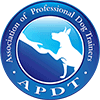
Mike with Annie
About The Trainer
Mike has been training dogs for over 20 years. He has a Ph.D. in behavioral psychology from The Ohio State University, which has helped immensely in understanding how dogs think.
He is also a Certified Professional Dog Trainer (KA), a member of the Association of Professional Dog Trainers, and a graduate of the Karen Pryor Academy for Animal Training & Behavior.
Mike began his training career with his own dogs and those of his friends and co-workers.
From 2007 to 2011, Mike was the volunteer trainer at the Humane Society of Delaware County, Ohio, where he was the key volunteer force behind the Dog Behavior Task Force program (Columbus Dispatch story).
He worked on basic cues with most of the dogs, but specialized in helping those dogs that had "rough edges" that were keeping them from being adopted: Perhaps they jumped up too much, or maybe did not like others to get near their food, or barked at everything.
Working with dogs at the shelter gave me experience with a wide variety of breeds and behaviors.
I quickly learned that the key to working with dogs was:
(1) Spending time with each one as an individual, and
(2) Finding out what that dog was already doing to communicate his thoughts to us.
Sometimes, these thoughts might be:

Mike with some friends
Mike's philosophy is that once we understand what our dogs are already trying to communicate to us with their actions, it becomes much easier for us to communicate with them about what we would like them to do:
Today is such an exciting time in the area of dog training! Research into the behavior of dogs has exploded over the last 10 years. Old and outdated methods that use choke chains, e-collars, spike collars, and intimidation have been shown to not only be ineffective, but to correlate with making dogs more aggressive (research report summary of report).
In addition, the way Dominance theory has been applied in dog training (i.e., the idea that dogs want to be the "Leader of the Pack" and so must be shown who's the boss through physical intimidation) has been shown to be not only invalid for dogs, but also for wolves in the wild (research report summary of report).
Instead, we now know that dogs are unique in the animal kingdom in their ability to know what we are thinking and feeling, and in following what we ask of them IF we ask it in the right way (reference).
So my goal is to understand what our dogs are already telling us, learn how to communicate in their language, and then pass that knowledge on to the guardians of these amazing creatures in my training classes.
Copper

The dogs that I adopted in the past were all great dogs just like Copper, but
this experience for me and I am sure Copper was nothing like my
past experiences.
I was amazed how much love and work Mike had given to our dog.
The level of caring for him really shows, and he is truly an awesome dog.
Again, thank you so much! Copper and his family really appreciate all the time Mike spent working and caring
for him. Also, only a red tennis ball like the one Mike gave him will do!
- The Moses family
Jerry
I can't tell you how relieved I feel to have you helping me with Jerry's training, Mike. I was so
upset after that other place's behavior class went sour, but yet I knew Jerry could be trained. THANK YOU for
caring about Jerry and wanting to help train him!!!!
- Jenny T.
Enzo

Mike, thank you for your very kind help and special concern for Enzo.
I will work with her and use your understanding of training methods and also the way dogs think!
- June C.

